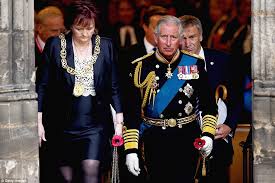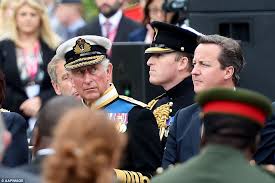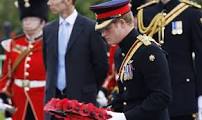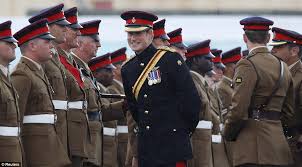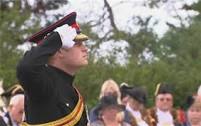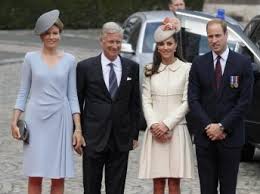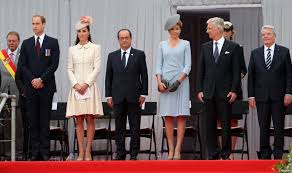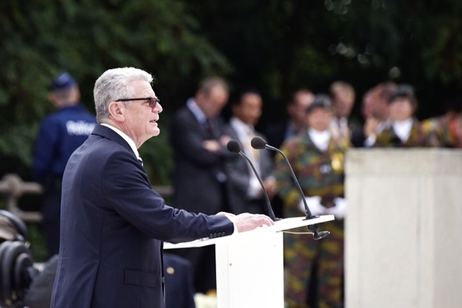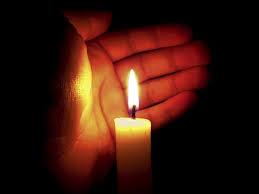Members of the Royal Family, Dignitaries, Heads of State, David Cameron the Prime Minister, and many other V.I.P.’S were out in force yesterday in Ceremonies across Britain and Belgium to mark 100 years since the German invasion of Belgium, which sparked the outbreak of World War One, and went on to claim the lives of 17 million soldiers and civilians.
The Queen attended a ceremony of commemoration at Crathie Kirk, and Prince Charles attended a service at Glasgow Cathedral
(along with many Commonwealth V.I.P.’s, and David Cameron)
The Duke of York attended a service of commemoration at St Anne’s Cathedral in Belfast, the Earl & Countess of Wessex, a service at Guildford Cathedral, the Princess Royal attended a service of commemoration at the WW1 Memorial Chapel in Carisbrooke Castle on the Isle of Wight, the Duke & Duchess of Gloucester, a service at Llandaff Cathedral in Cardiff, and the Duke of Kent formally opened the photographic street gallery “Fields of Battle – Lands of Peace 14 – 18″ in St. James’ Park, London.
Prince Harry attended the “Step Short” commemorative event in Folkestone, where he laid a wreath,
and met members of the armed forces,
who later marched along the same route which the service men had taken 100 years ago, into what we now know, was an almost certain death.
A Memorial Arch has been built to commemorate this route, upon which Prince Harry unveiled a plaque.
Prince Harry spent much time saluting the different Military Personnel as they marched along the route,
staring poignantly at the road, even after they had finished.
The Duke & Duchess of Cambridge arrived at L’Abbaye Saint- Laurent in Liége, where they were greeted by King Philippe and Queen Mathilde of Belgium.
They then went to the Cointe Inter-allied Memorial for a service, which included wreath-laying and a minute’s silence.
There, they were joined by many V.I.P’s and Heads of State, including French President François Hollande,
Irish President Michael D Higgins, and German President Joachim Gauk.
Prince William, French President François Hollande, German President Joachim Gauck, Belgian Prime Minister Elio du Rupo and the King of Belgium gave speeches.
Prince William delivered a powerful and thought-provoking speech, as follows;
“Your Majesties, Presidents, Prime Ministers, Ministers, Ambassadors, distinguished ladies and gentleman.
In the summer of 1914, the Austrian writer, Stefan Zveig, was on holiday in Belgium near Ostend. He describes how people from all over Europe were enjoying themselves together and comments that a great deal of German was spoken because holidaymakers from the Rhineland liked to come to the Belgian beaches.
Just days later, this carefree harmony was shattered by the outbreak of the First World War. During four terrible years, those same Europeans were engulfed by killing and destruction. Among the very first victims were the people of Belgium, whose resistance was as gallant as their suffering was great.
The magnificent war memorial where we gather today honours the city of Liége and its people for their courageous resistance in 1914. The memorial – and this ceremony – also honours all Belgians, who fought, suffered and died in the Great War.
Your great sacrifice and your contribution to eventual victory was pivotal. Belgium’s resistance in 1914 allowed the Allies to re-group and draw up the battle lines which became the infamous trenches. These trenches have left an indelible scar on your land – they speak of the horrors of war but also of your forebears’ courage.
That courage was shown not just by your Armed Forces, but by your civilian populations. I know that in the coming months, you will be commemorating the massacre at Dinan and the burning of the great library at Lervan.
Many nations here today, the United Kingdom among them, owe you a great debt of gratitude for your fortitude and resistance.
This evening, at Saint Symphorien Cemetery in Mons, Catherine and I will visit a site which was donated by a Belgian landowner to the German Army, so that soldiers from both sides could be buried near where they fell. Belgium’s commitment to honour the war dead continues to this day. In Ypres, Belgian volunteers have played the Last Post every night since 1928 – except during the Second World War.
Your Majesties, if I may say so, Belgium’s steadfast remembrance of your war dead, and ours, is a great credit to your nation. On behalf of Her Majesty Queen Elizabeth, head of the Commonwealth, thank you for the honour you do us all.
In Europe, the transition from war to lasting peace has taken time. Edith Cavell was a British nurse who saved soldiers from each side. On the night before she faced a German firing squad, she said “I must have no hatred or bitterness towards anyone.” It took another terrible war to learn the truth of her words, and even today we continue to learn that lesson. The events in Ukraine testify to the fact that instability continues to stalk our continent.
The peace that we here enjoy together as allies and partners does not simply mean no more bloodshed – it means something more than that. The fact that the presidents of Germany and Austria are here today, and that other nations – then enemies – are here too, bears testimony to the power of reconciliation.
Not only is war between us unthinkable, but former adversaries have worked together for three generations to spread and entrench democracy, prosperity and the rule of law across Europe, and to promote our shared values around the World.
We were enemies more than once in the last century, and today we are friends and allies. We salute those who died to give us our freedom. We will remember them.”
Prince William’s speech was followed shortly afterwards by this speech from Germany’s President Gauck.
“The fact that I am standing here and speaking to you today can by no means be taken for granted. I would like to express my heartfelt thanks to you, Your Majesty, for your kind invitation. I would also like to thank all Belgians who extended the hand of reconciliation very shortly after the Second World War, after their country had been invaded twice by German troops, and after all the atrocities, suffering and despair of the two wars.
I also thank you for this gesture on behalf of all my fellow Germans.
We are here today to commemorate the terrible “Great War”, which became the first of the two world wars. This war began in western Europe with Germany’s completely unjustifiable invasion of neutral Belgium. The invasion only followed military logic, and it thus became apparent on the very first day of the war that treaties were worthless and that the standards of civilisation had been rendered null and void.
Outside Germany, people were horrified by the conduct of the German troops, particularly by their treatment of civilians and their attacks on cultural heritage. The destruction of the world famous library in Leuven became a symbol that spread fear, shock and rage far and wide. But in Germany itself, intellectuals and artists wrote a disgraceful text in which they declared that crimes against a country and its people, including even attacks on culture, were justified and indeed necessary. What had become of the community of scholars and artists? What had happened to the civilisation called Europe?
Nationalism had blinded almost everyone’s hearts and minds. Neither the standards of culture and civilisation, nor religious faith, nor reason were strong enough to sway people’s consciences in another direction. On the contrary, people actually believed that they were morally and religiously in the right. In the clash of cultures, feelings of superiority and extreme national egoism triumphed over empathy.
The utter failure of diplomacy; the ill fated Schlieffen Plan; the longing for what was supposed to be an invigorating cleansing of an epoch tired of civilisation through immersion in the ferruginous waters of war; the erroneous belief in a short military campaign to resolve international disputes; and finally, propaganda that knew no bounds and demonised the enemy in a way hitherto unknown – all of this led Europe into a fratricidal war, which ultimately spread far across the world.
With the invasion of Belgium by German troops at the latest, and as in Greek mythology, Pandora’s box had been opened, bringing misfortune, misery, crippling injuries and death to millions of people.
Along with representatives from all over the world, we commemorate those killed in action, the wounded, and those left physically and emotionally mutilated by the war. We will always remember and honour them. We are grateful to have been able to live together in peace for so long here in Europe. We know that this is not something to be taken for granted. Belgium, the home of Europe’s institutions, is a particularly appropriate place to praise European unity. Europe is now governed by the strength of the law rather than by the law of the strong. The fact that small and large member states of the European Union now strive to find joint solutions and agree on joint policies in a peaceful manner in Brussels is an achievement of civilisation that cannot be overstated.
We know all this from our own terrible history. But we are also aware of it when we look at the current state of the world. We see war and civil war in so many places. Millions of people are afflicted by violence and terror; millions have fled their homes. Political, ethnic and religious beliefs are still being exploited to justify violence and murder. Fanaticism and extremism continue to spread fear and terror.
We are therefore not only united here today in commemoration as representatives of so many countries, but also to remind each other that we share responsibility for the world. We cannot remain indifferent when human rights are violated or when violence is threatened or used. We must actively champion freedom, the rule of law, awareness, tolerance, justice and humanity.
The two great wars taught us terrible and bitter lessons. Let us show not merely through words of remembrance and commemoration, but also through our actions in the present and future, that we truly learned our lesson.”
——–
Lunch followed at the Hotel de Ville in Liege for a ceremony which included an appearance by the Duke & Duchess of Cambridge and Prince Harry on the balcony, (to the delightment of an excited crowd), and a fly past by the Belgian Red Devils.
Afterwards, the Duke & Duchess of Cambridge and Prince Harry went to a reception at Mons Town Hall, and then onto the beautiful St Symphorien Military Cemetery, where British, German and Commonwealth soldiers are buried together, (and which had been floodlit for the occasion), for an evening of reflection in the form of poetry and readings from actual letters written by the soldiers of World War One to their relations, which only went on to further highlight their immense bravery.
In most cases, the soldiers seemed to imply in their letters that they knew that they would not be coming home, but encourage their relations ‘not to worry’ and ‘keep their chins up’, and that everything was ok. (Thereby letting them down lightly, whilst still managing to send that all-important last letter home.)
It defies belief, that even after all of the slaughter and carnage which they had encountered, and the terrible conditions within which they were living, their main priority was to put the feelings of their relatives before their own.
Going to an almost certain death, but taking every possible step (within their capabilities), to make sure that their loved ones would not encounter wretched feelings of grief for the rest of their lives, as they would always have that last chirpy letter to look at.
And therein lies another example of “The Triumph of the Human Spirit”.
During the evening, David Cameron made a speech, in which he said “Every war is cruel. But this war was unlike any other. The unspeakable carnage, the unbearable loss, the almost unbelievable bravery. One hundred years on, it is right that we meet here – and around the World – to remember.”
Later, when the public was invited to ‘light a candle’ between the hours of 10.00 p.m. and 11.00 p.m. for ‘Lights Out’, (as World War One was declared at 11.00 p.m. in 1914), many extremely memorable services took place at Ceremonies across the Country, (and indeed, the World).
In Belgium, The Duke & Duchess of Cambridge, Prince Harry and David Cameron, (alongside other French and German V.I.P.’s.), held their own candle-lit vigil.
At Westminster Abbey, a demure Duchess of Cornwall, Deputy Prime Minister Nick Clegg, Labour leader Ed Miliband, Metropolitan Police Commander Sir Bernard Hogan-Howe, and many other V.I.P.’s attended a service of solemn commemoration to mark the centenary of World War One.
The service involved the gradual extinguishing of candles, with an oil lamp extinguished at the tomb of the unknown warrior at 11.00 p.m.
The Pascal candle was left to burn in The Abbey to reflect the idea of hope during such a dark time.
The ‘Lights Out’ event was inspired by the words of the Foreign Secretary Sir Edward Grey, who at that time, said, “The lamps are going out all over Europe; we shall not see them lit again in our lifetime”.
It was a really poignant and humbling moment, which personally, made me feel ‘at one’ with the millions of others who had joined in to pay their respects in this special way and to pay homage to the extraordinary bravery of the military personnel who gave their lives for us.
In the words of Prince William -
“We will remember them…..”




